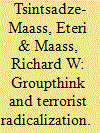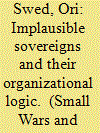| Srl | Item |
| 1 |
ID:
134984


|
|
|
|
|
| Summary/Abstract |
Why do groups adopt terrorism? Major theories of terrorist radicalization assume it to be a rational process whereby groups select terrorism as the policy most likely to advance their goals. Not all terrorism is rational, however, and these theories cannot explain cases when groups pursue terrorism despite it being self-defeating. We distinguish between rational and irrational terrorism, and explain the latter using social psychology's groupthink mechanism. Although terrorists are widely assumed to be vulnerable to groupthink, empirical work on the phenomenon has focused overwhelmingly on decision-making by national executives. We firmly establish the link between groupthink and terrorist radicalization by tracing groupthink's operation through the development of the Weather Underground, an American terrorist group that emerged in the late 1960s and conducted six years of bombings against the U.S. government. All of the antecedent conditions, symptoms, and decision-making defects predicted by groupthink are evident in the Weather Underground, providing valuable evidence of the dangers of irrational radicalization and offering lessons for its prevention.
|
|
|
|
|
|
|
|
|
|
|
|
|
|
|
|
| 2 |
ID:
181957


|
|
|
|
|
| Summary/Abstract |
The havoc and disarray among governments and societies caused by the COVID-19 outbreak also invited opportunities for violent non-state actors to exploit for their advantage governments’ failure to provide an adequate public health response or their denigration of security apparatuses due to the outbreak. Focusing on the early months of the outbreak, this study examines three courses of actions taken by those actors and the potential explanation for the variation in responses. The responses examined are actors offering COVID-related public health response as a surrogate for the state, the extension of hostilities, and the request for a ceasefire. Looking at a sample of 72 groups we suggest that the actors’ governance levels, which dictate their organizational logic and behavior, are strong predictors for the likelihood of them offering public health support, conduct attacks, or pursues a ceasefire during the period examined.
|
|
|
|
|
|
|
|
|
|
|
|
|
|
|
|